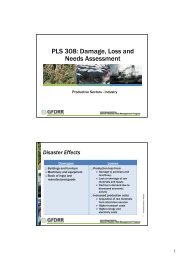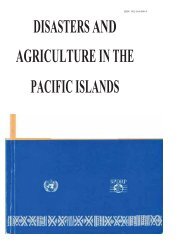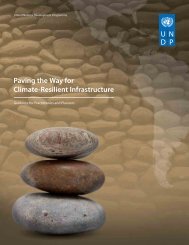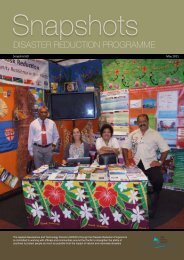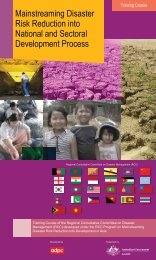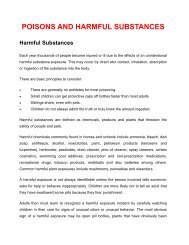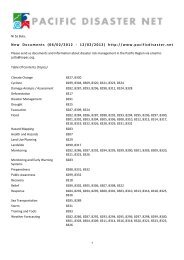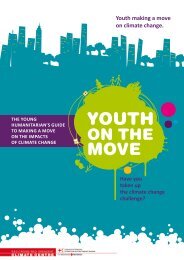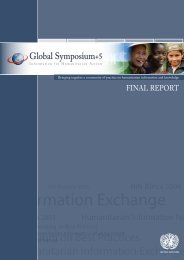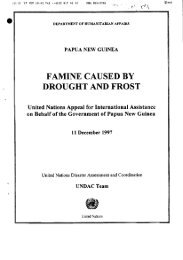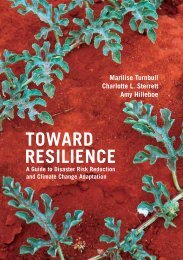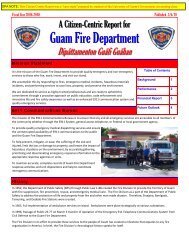A global review of disaster reduction initiatives - Welcome to the ...
A global review of disaster reduction initiatives - Welcome to the ...
A global review of disaster reduction initiatives - Welcome to the ...
You also want an ePaper? Increase the reach of your titles
YUMPU automatically turns print PDFs into web optimized ePapers that Google loves.
ole in defining <strong>the</strong>se future requirements forRCC functions in <strong>the</strong> Regions through <strong>the</strong>ircross-program analysis and wide circulation <strong>of</strong>multi-disciplinary information. At <strong>the</strong> sametime <strong>the</strong> predominant, and distinctive, rolesand requirements <strong>of</strong> different geographicalregions around <strong>the</strong> world are recognized asbeing crucial <strong>to</strong> <strong>the</strong> most effective accomplishment<strong>of</strong> <strong>the</strong> intended objectives. As a broadconceptual framework <strong>of</strong> RCCs continues <strong>to</strong>emerge, attention will proceed with individualRegions considering <strong>the</strong>ir specific requirementsand assessing current operational andtechnical abilities <strong>to</strong> meet <strong>the</strong>m.Wildfire and related hazardsThe current state <strong>of</strong> fire science that includesfundamental fire research and fire ecology and<strong>the</strong> results <strong>of</strong> bio-geochemical and atmosphericsciences research <strong>of</strong> <strong>the</strong> last decade providesufficient knowledge <strong>to</strong> support decision-makingin fire policy at most management levels <strong>of</strong>responsibility. However, in many countries thiswealth <strong>of</strong> knowledge and expertise is ei<strong>the</strong>r notknown or is not readily accessible and availablefor developing adequate fire policies and relatedmeasures <strong>of</strong> operational management. Theprolonged and severe fire and smoke episodethat occurred in Sou<strong>the</strong>ast Asia in 1997-98demonstrated that <strong>the</strong> available knowledgeabout fire and <strong>the</strong> related management expertisewas utilized only <strong>to</strong> a limited extent. Thesecircumstances led <strong>to</strong> confusion and uncertaintyat national, regional and international levels <strong>of</strong>responsibility, resulting in delayed decisionsand <strong>the</strong> late application <strong>of</strong> appropriately targetedinternational response <strong>to</strong> <strong>the</strong> fire and smokeemergencies. Retrospectively this could beexplained by <strong>the</strong> lack <strong>of</strong> a regional Sou<strong>the</strong>astAsian fire information system.Considering <strong>the</strong> wider extent <strong>of</strong> fire issuesaround <strong>the</strong> world, as well as <strong>the</strong> extent <strong>of</strong> <strong>global</strong>experience in <strong>the</strong> field. The establishment <strong>of</strong>an institution preliminarily designated as a"Global Fire Management Facility" was proposedby a number <strong>of</strong> international conferencessince 1996. On <strong>the</strong> basis <strong>of</strong> <strong>the</strong>se recommendations<strong>the</strong> Government <strong>of</strong> Germany respondedthrough <strong>the</strong> Office for <strong>the</strong> Coordination <strong>of</strong>Humanitarian Assistance in <strong>the</strong> Ministry <strong>of</strong>Foreign Affairs <strong>to</strong> establish a Global Fire Moni<strong>to</strong>ringCenter (GFMC) at <strong>the</strong> Max PlanckBuilding understanding: development <strong>of</strong> knowledge and information sharingInstitute for Chemistry in Freiburg, Germanyfrom Oc<strong>to</strong>ber 1998.The GFMC serves an active role in <strong>the</strong> documentation,information and moni<strong>to</strong>ring servicefunctions among <strong>the</strong> fire science community,<strong>the</strong> technical community <strong>of</strong> engineering, technologydevelopment, <strong>the</strong> primary user community<strong>of</strong> fire managers, as well as policy makers.It aims <strong>to</strong> provide widespread and timely informationin <strong>the</strong> field <strong>of</strong> long-term strategic planningfor <strong>the</strong> prevention <strong>of</strong> disastrous wildlandfires as well as enabling preparedness measuresand appropriate responses for fire emergencies.A worldwide network <strong>of</strong> many institutions andindividuals generates GFMC products <strong>of</strong> bothnational and <strong>global</strong> scale. All <strong>of</strong> that informationand data are systematically collected, interpretedand displayed on <strong>the</strong> Internet by <strong>the</strong>GFMC at www.uni-freiburg.de/fireglobe.The information remains current, being updatedfrequently, and as may be required, daily. Itis <strong>the</strong>n archived for future reference orresearch purposes.Seismic HazardsWhile <strong>the</strong>re are many seismological and seismicengineering institutes around <strong>the</strong> world,widely known among <strong>the</strong> practitioners mostimmediately involved for <strong>the</strong>ir technical orinformational services. Two representativeexamples <strong>of</strong> information centers are cited herethat are particularly engaged in <strong>the</strong> dissemination<strong>of</strong> information about <strong>the</strong> seismic hazards.The Earthquake Hazards Program <strong>of</strong> <strong>the</strong>United States Geological Survey (EHP/USGS) is part <strong>of</strong> <strong>the</strong> National EarthquakeHazards Reduction Program lead by <strong>the</strong> FederalEmergency Management Agency. Thisprogram has <strong>the</strong> primary objective <strong>to</strong> providerelevant earthquake science information andknowledge for reducing deaths, injuries, andproperty damage from earthquakes throughunderstanding <strong>of</strong> <strong>the</strong>ir characteristics andeffects and by providing <strong>the</strong> information andknowledge needed <strong>to</strong> mitigate those losses.The EHP/USGS' role is <strong>to</strong> provide earth sciencesinformation and related products forearthquake loss <strong>reduction</strong>. Information is availableon its website at (www.earthquake.usgs.gov/ ) <strong>to</strong> serve its specific goals.1734



